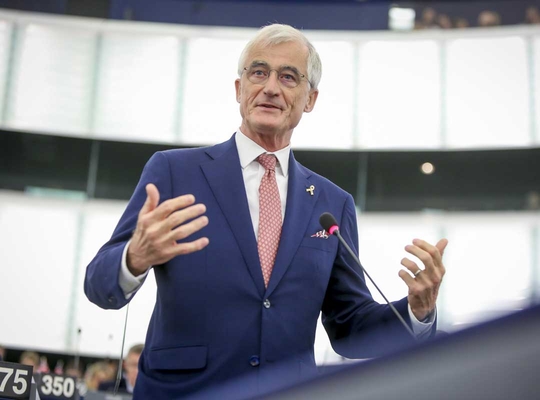You are here
Algorithms will be a merciless censor

Free speech dies if we allow the algorithms. Europe and our federal government must defend the freedoms of our liberal democracy,” says the MEP in an opinion piece.
I recently warned about the restriction of the freedom of expression as proposed by the European Commission. For well-known reasons (read: Donald Trump) the discussion about (the limits of) free speech online has now been brought into sharp focus. As well it should. Freedom of speech is a fundamental right. Restrictions on this must always be limited. There is no doubt that censorship has no place in the European rule of law. A European legislative proposal that could result in censorship calls for a response from me as a member of the supervisory authority, the European Parliament.
President Trump is not the only person experiencing the omnipotence of online platforms. The consequences are becoming increasingly clear to us here, as well. This week, the opinion website Doorbraak saw an ordinary critical article removed by Facebook and a rapper from the Kempen region who made a parody of QAnon received a “final warning” from Facebook, after which his video was removed. It is clear: free speech, and certainly humour and satire, will not survive being put through the mill of the algorithms. Unfortunately, the push of a button is enough to censor opinions.
Detection system
At the end of last year, the European Commission proposed a European Digital Services Act that relegates freedom of expression to second place, apart from some theoretical lip service. Among other things, it regulates the liability of platforms for the content posted by users. As a rule, a platform is not liable for this, unless it is aware of the illegal activity.
The problem is that the law provides for an extensive “whistleblowing system”, whereby anyone can report alleged illegality. You can already imagine the deluge of well and less well-intentioned reports. The mechanism of “reporting, knowledge and accountability” unmistakably encourages platforms to go through “controversial” statements without any restrictions. The spectre of censorship is threatening to haunt the European Union once again. The remedies come when the damage is done. If the user is at least brave enough to litigate.
I warn against the omnipotence of (American) private players. How will they judge an opinion piece on, say, the Aalst Carnival or Zwarte Piet? Will Facebook block a plea for the marriage of an LGBTQIA+ couple because it is illegal in some Member States? Can you still criticise a head of state? And what about arguments for the independence of a federal state in the European Union? Rest assured that algorithms will be a merciless censor.
Universal service obligation
Major online platforms should be required to allow everyone to access their platform in principle. Everyone should have the right to post and receive information on it. The social function of these platforms is so immense that the EU should impose an obligation to provide universal service on them.
Online platforms are the letterboxes of the 21st century. The postal service has known for a long time that it must provide a universal service. The same logic applies today to the Facebooks and Twitters of this world. This must be reflected in their general terms and conditions. It is not acceptable to delete, suspend and block at will.
Restrictions
Freedom of speech is not absolute, but allows for proportional exceptions. A letter bomb should not be sent, nor should a call to storm the Capitol be hosted online.
My proposal is to include in the European Digital Services Act an exhaustive list of the most obvious infringements for which an online platform can independently proceed to remove them. I am thinking of unlawful content such as human trafficking, terrorism, the sexual exploitation of children, organ trafficking and arms trade. The large online platforms must develop a comprehensive internal policy for this, which also makes a clear distinction between inciting and denouncing a crime. Action against alleged illegal activity is a matter for the courts in a state governed by the rule of law.
Where are the European Commissioners and our federal government to defend the freedoms of our liberal democracy?

